Jadon Sancho: Borussia Dortmund's ex-Man City winger living the 'dream'
- Published
- comments
Sancho tries to emulate Ronaldinho skills
Watch Football Focus on Saturday, 24 February from 12:00 GMT on BBC Two and the BBC Sport website. |
It takes an incredible amount of belief and bravery to turn your back on Manchester City and manager Pep Guardiola when you are just 17.
Last summer, Jadon Sancho did exactly that.
City were extremely keen to keep the hugely talented English forward but Sancho - concerned about his first-team prospects - signed for German side Borussia Dortmund for a reported £8m on 31 August.
Since then, he has won an Under-17 World Cup with England, become friends with Pierre-Emerick Aubameyang and started to make an impact in the Bundesliga.
Earlier this week I sat down with him for his first major interview since he left the Premier League and encountered a polite, personable, softly spoken young man.
However, more than anything else, what shone through was Sancho's fierce determination to succeed.
Making a breakthrough in the Bundesliga
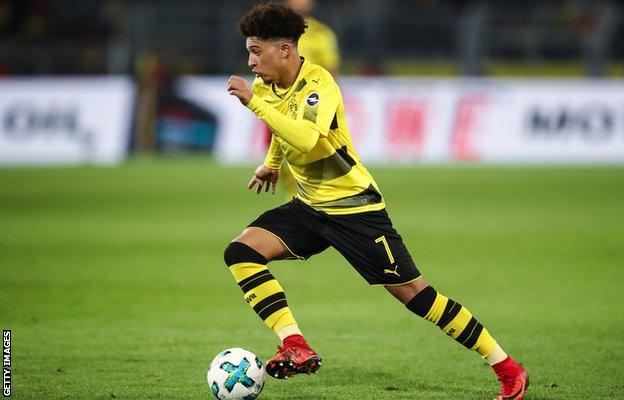
Jadon Sancho has made six Bundesliga appearances this season - three starts - and provided one assist
Sancho had the chance to join Barcelona and Real Madrid when he left City in August.
Instead he opted for Dortmund - the club where Liverpool boss Jurgen Klopp became famous, where Matthias Sammer won the Champions League and the Ballon d'Or. They play their home games at the magnificent Westfalenstadion, in front of the legendary 25,000-capacity 'yellow wall' at the south end of the ground.
Sancho has been given the number seven shirt, previously worn by Ousmane Dembele before he was sold to Barcelona for £135.5m last August. Most importantly, he has been given a chance.
From the resumption after the winter break in mid-January until he suffered the ankle injury that will keep him out for another fortnight, Sancho played in four successive games, starting three.
The reaction, from fans and management, was overwhelmingly positive.
Sancho is yet to score but he created a crucial goal for Shinji Kagawa in a 1-1 draw at Hertha Berlin and impressed with his dribbling and desire to get on the ball. He was named the Bundesliga's rookie of the month for January.
"To play for the first team, in front of the yellow wall, is a dream come true," Sancho told BBC Sport.
"I would have taken any number but getting seven was a big boost to my confidence. It doesn't faze me. It is about coming here and proving myself. That is why I am here."
Speak to senior people at Manchester City and they will say Sancho was listening to the wrong advice when he turned his back on a very lucrative contract. City signed him from Watford as a 14-year-old and he played in the same teams as Phil Foden and Brahim Diaz, who have both gone on to appear in City's first team this season.
Others who have worked closely with Sancho have defended his support network, insisting they always act in the teenager's best interests and have immense belief in him.
Sancho does not want to discuss why he left City but is keen to stress the importance of the people around him.
"It is good to have the support I have," said Sancho. "I am blessed that I have family around me wishing me good things."
It is clear his family are strong influences in Sancho's life. His dad lives with him in Dortmund and although he badly misses his mum's cooking, Sancho is learning German and showing the focus and determination that has already taken him on an extraordinary footballing journey.
Trailing across London - 'an incredible desire to succeed'
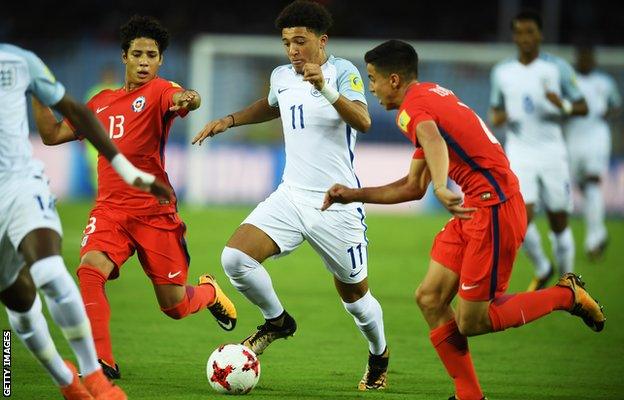
Jadon Sancho has won 27 of his 32 games for England at Under-16, U17 and U19 level
Sancho has referred to the area where he grew up, in the south London district of Kennington, as "the hood".
It is a place he owes a lot to, and where he first started kicking a ball with his friends.
But Sancho accepts that if he had remained there, his situation might be very different.
"Life would not have been too good for me because there were a lot of bad people," he said. "I just wanted to get away. What might have happened if I hadn't is with me all the time."
Sancho was spotted by Watford at the age of seven and two years later registered with them as a player. For three years after that, he travelled three times a week from home to Watford and back, for training and games.
In theory, going the quickest route straight through the centre of London, it is a round trip of about 45 miles and takes two hours. But after school, moving into rush hour, the journey could easily take twice that.
"It is a massive commitment," said Watford's head of academy Chris McGuane.
"We still want them to be kids. We don't want them to spend all their time in a car, eating in the car. That is why we board some of them them at Harefield."
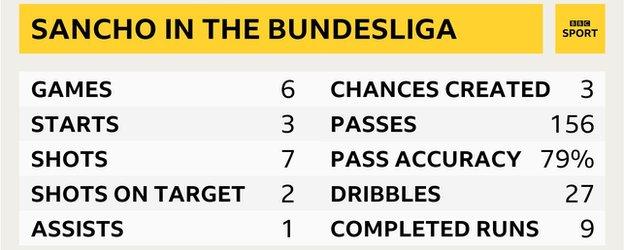
Aged 12, Sancho left his family to stay in 'digs' at the Harefield Academy in Uxbridge so he could devote as much time as possible to his football.
"It was hard being away," reflects Sancho. "Really hard. But you have to do what you have to do if you want something so bad."
Sancho's enthusiasm and willingness to learn matched the precocious nature of his ability.
Brazilian Ronaldinho is his hero and he watches YouTube to see what tricks and tips he can find that can be finessed on the training ground and put into practice during "tricky situations" in matches.
McGuane recalls: "Even during games Jadon would come over and ask for feedback. He would self-correct things he felt had not gone quite right.
"His hunger to succeed was immense."
So hungry that Sancho would deliberately make it as difficult as possible for himself because he recognised that was where the greatest improvement would be made.
"He would always go and stand next to the best defender in the opposition team," added McGuane. "He never wanted an easy ride. He was challenging himself."
Dan Micciche is the current MK Dons manager and was Sancho's England coach at both under-15 and under-16 level.
He tells a story from a four-team tournament in Florida in December 2015.
Micciche had impressed on his players the value of a basic one-two, showing them video evidence of how the Barcelona trio of Lionel Messi, Xavi and Andres Iniesta had used it to such great effect.
They worked on passing the ball against a wall and then collecting it. Micciche's pay-off was that his players would not be able to emulate it "because they were English".
Sancho scored. From a one-two.
Micciche said: "Jadon came running up after the game and said 'wall pass'. It hadn't even registered but when I watched it back, it was. That's the thing with top players, they love being set challenges. They rise to them."
How good can he be?
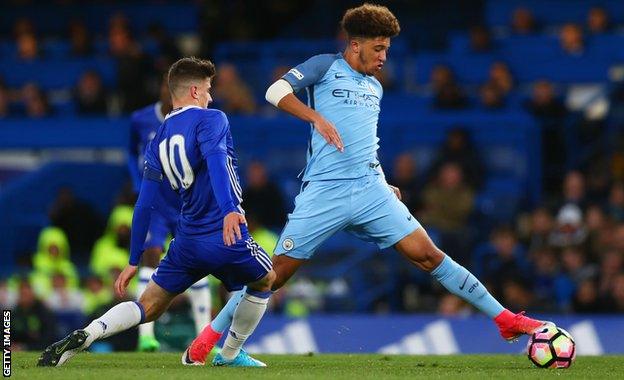
Jadon Sancho played for all of Manchester City's youth teams, but never made the bench for a first-team game
Micciche is not someone given to hyperbole. However, he accepts that even at national level Sancho stood out.
He said: "When he came to us as a 15-year-old, Jadon was sensational. And I don't say that lightly.
"What stood out was how he could take people on at speed. A lot of the time you either get a technician or someone who is rapid. He had both and he could dribble both sides."
It is the sort of ability that caught the eye at the Under-17 World Cup in India last year before Dortmund called Sancho back to Germany at the end of the group stage. When England beat Spain 5-2 at the end of October, Sancho had to watch from afar.
Staff at Dortmund have been impressed by Sancho's humble manner.
He doesn't do much away from the training field, where he wants "no distractions".
He spends his time relaxing at home, listening to music - J Hus is a big favourite - taking German lessons and keeping in contact with Ademola Lookman and Reece Oxford, fellow youngsters who have also swapped England for the Bundesliga, with RB Leipzig and Borussia Monchengladbach respectively.
At this stage of the season two years ago, Marcus Rashford was about to start a run of games for Manchester United that propelled him into England's squad for Euro 2016.
There is a World Cup on the horizon. Deep in the recesses of Sancho's mind, is it something he has thought about? He laughs at the question.
"That is a big one. I would be honoured if they pick me. But I haven't thought of it like that, no."
When the interview is over, Sancho goes outside and is filmed for the television interview that will appear on Football Focus on Saturday, 24 February.
But before heading home, he comes back into the media room to shake hands and thank me for my time. It really should have been the other way round.
- Published21 October 2017
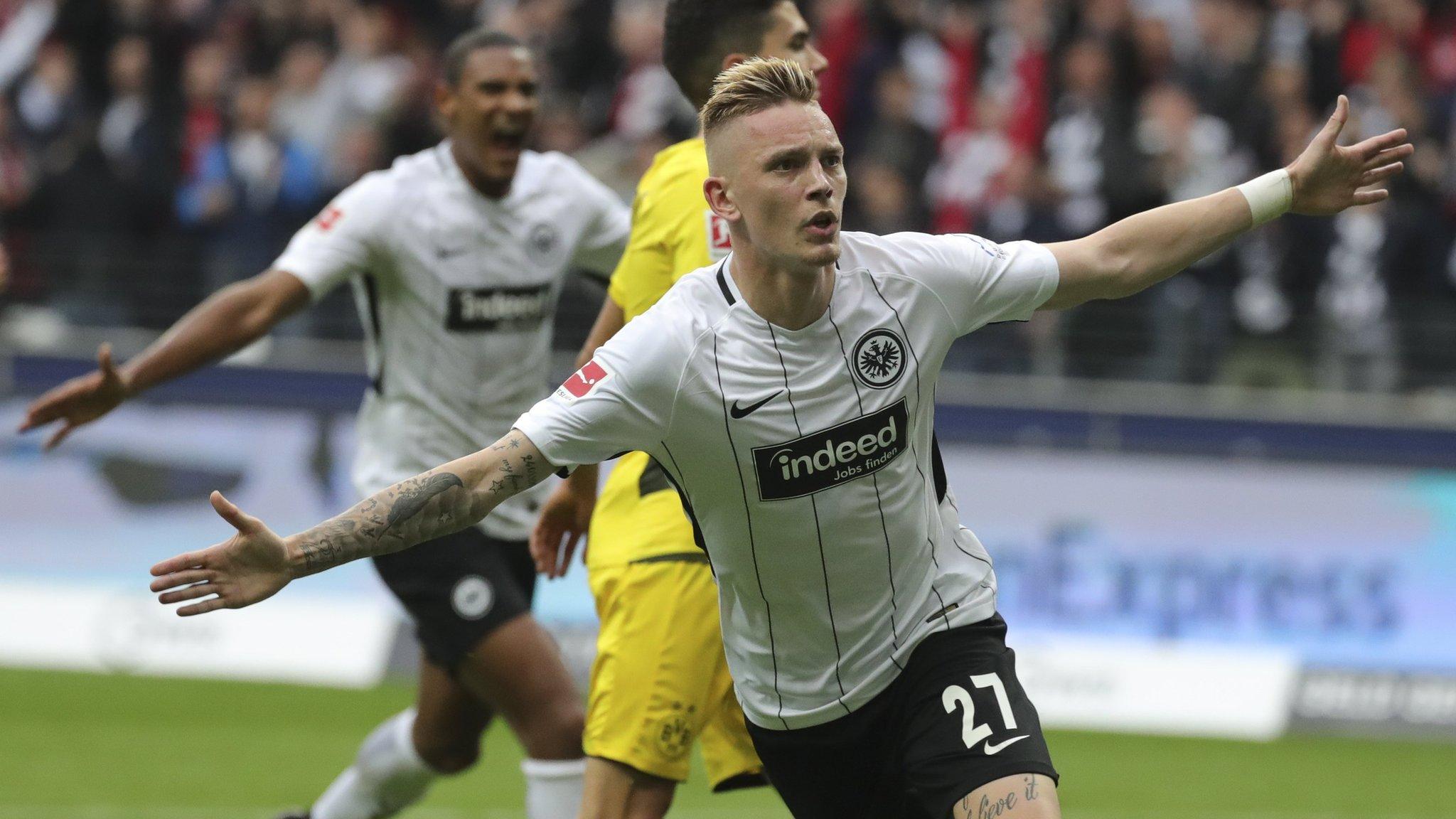
- Published16 October 2017
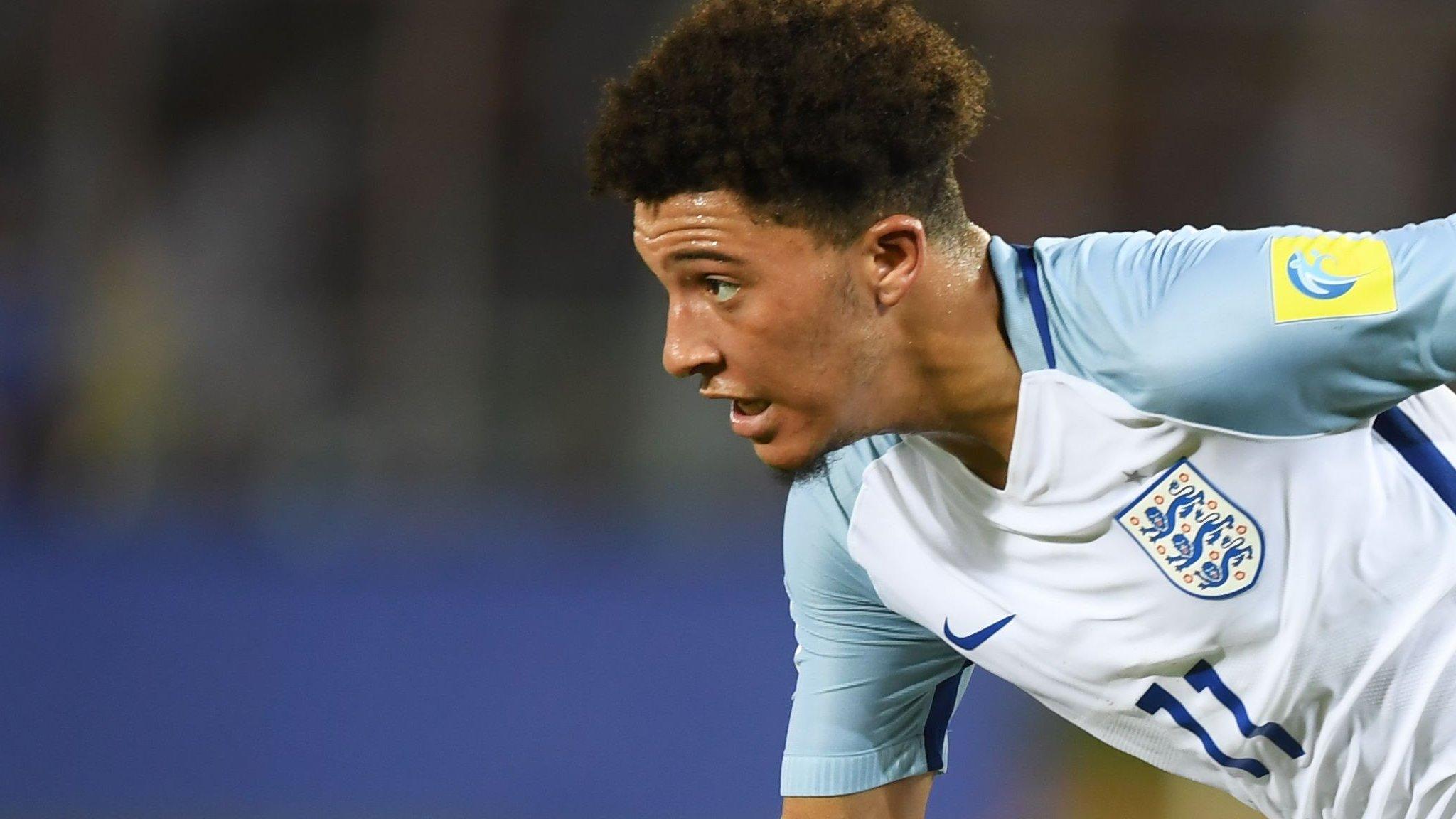
- Published8 September 2017
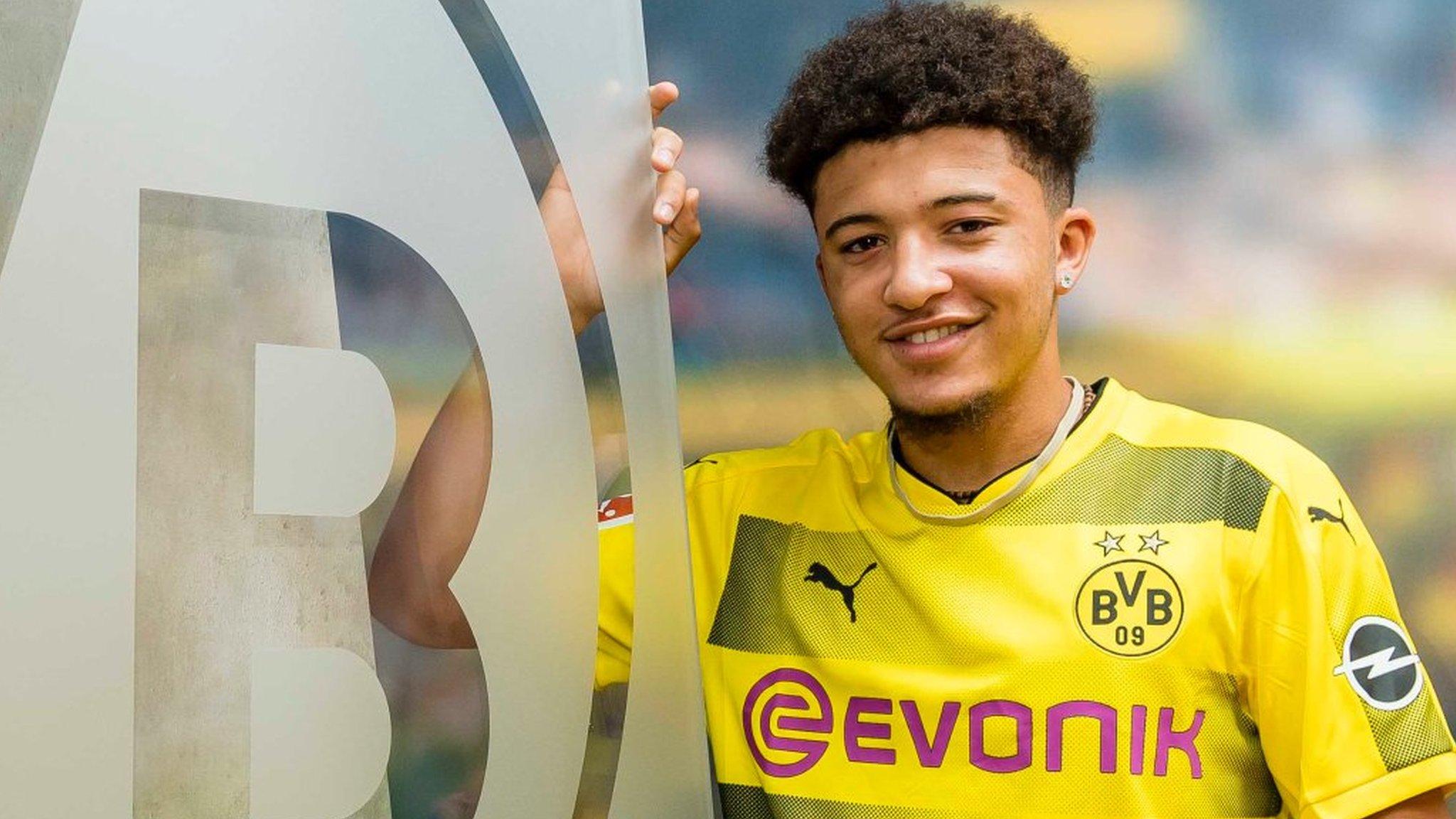
- Published7 June 2019
